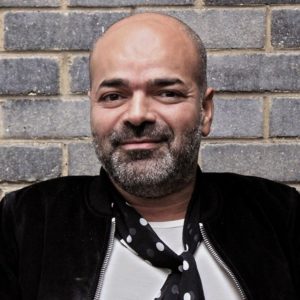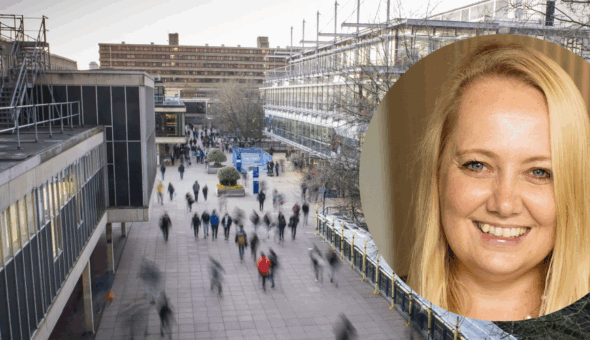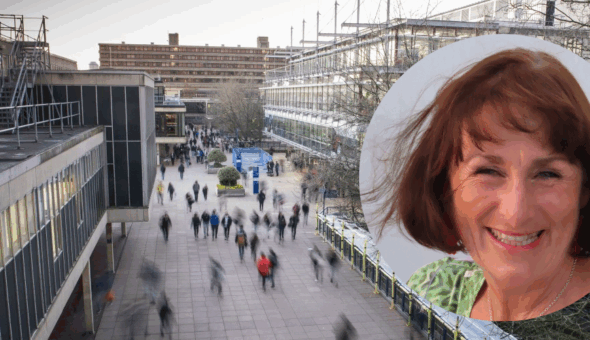With a career in television spanning more than 20 years, Ash Atalla is known for his work producing comedies including The Office, The IT Crowd and People Just Do Nothing. He is Managing Director of independent production company Roughcut TV, based in London.
He tells us about leaving the City, the importance of zooming out and his lifetime membership to Moles...
 Why did you choose to study at Bath?
Why did you choose to study at Bath?
It was the best in class for business at that time. When I did some research, I think it came up as the hardest one to get into – which piqued my interest and scared me. It's quite a random moment in your life when you start looking at universities.
I'm in a wheelchair and a lot of red-brick universities were around cities, so you would have to go to one lecture building and then cross town for another one. Practically speaking, that wasn't great, but because Bath is a campus university, we could figure out a route with a lift to almost everywhere.
The funny thing is, I didn't really pay enough attention to Bath itself, which is probably the worst place – cobbles, hills, steps – so I remember thinking in my first week that I probably should have looked around the town a bit more!
Did you have a particular career in mind when you chose to study Business?
I was really narrowly focused on not just business, but even more specifically on stockbroking. The problem was that I wasn’t the best in class at maths. I was okay, and I think I actually got worse as it got more complicated. The truth is, I had a sense of unease that the career I wanted wasn't the career I was suited for.
I did some placements in banks in London, which were okay but confirmed my niggling doubt. I got a graduate job stockbroking and I did that for 18 months, then had a mid-life crisis at 24. Most people might change career paths later in life, but I had a complete change of direction young, which left everyone, including my parents, quite confused. It's quite disorientating: you do GCSEs, A-levels, go to uni, do the placements, get the job. And then after all of that, you're like, ‘no!’ But that was my story.
Did your business degree help you in your career since graduating? How did your university experience shape you?
It did and it still does – there's nothing, really, where business isn't happening. Now, although I work in a creative industry, I run a production company and of course there’s a deal-making element to that. The thing that I really enjoyed at Bath was business psychology. I still carry that with me, as well as the marketing, advertising and PR. Those things are really important in television. The things where I slightly glazed over were the accounts and the pure maths of business.
Can you tell us about your experience of studying here? Any favourite memories, or places to go on campus and in the city?
My go-to spot was a nightclub called Moles. The owner was really clever; he would know when it was freshers’ week and all these young, fresh-faced, 'we don't know what we're doing’ students would come in. I remember him telling me we had to pay membership. I asked if it was for a year and he said, “Well, be better if you do membership for life.” I was like, “Oh, okay, here's £100!"
Their thing was they'd get big bands before they became famous, so I met Blur there one night just before they had their huge first single and became megastars. I also genuinely remember a nightclub under Bog Island, and I think it had been made in a refurbished public toilet. So I went nightclubbing in a toilet. Thanks, Bath!
What does the role of TV producer entail? What's a typical day like for you?
It's my job to creatively develop programmes, to put shows together from script to casting and then to sell that show to broadcasters. I have an independent production company called Roughcut, so we sell to all the major broadcasters: BBC, Channel 4, Netflix, Apple, Sky, Disney and Hulu, both in the UK and internationally.
My day can be anything from spending an hour trying to make a joke work better, to a presentation to Apple, having lunch with an actor or travelling to LA. I find it very varied. I have to read a huge amount of scripts, meet many writers and actors, and sell a lot to broadcasters. A huge part of our job is in the edit, as well, so it really depends where the project is in its life.
It's a reasonably fun way to make a living. It’s not without its pressures and it's hugely, globally competitive, but I am under no illusions. It's much more fun than I thought I was going to have in stock markets! It's a career that I didn't expect, so I feel very lucky.
What was your path into the TV industry?
Obviously business was the path I was going to take, and then when I when I parted ways with the City, believe me, they were not sad to see me go. I don't think they felt they were losing the next Warren Buffett! I'd ended up pursuing this mathematical career, but the thing that I'm actually good at is the very opposite – words, rather than numbers. Unusually good at words and maybe unusually bad at maths, so I was just completely in the wrong territory.
I really don’t know where the TV thing came from. I was a huge watcher of comedy, but I had no experience in it so I just started writing letters to the BBC. To cut a long story short, I ended up doing a lot of work experience and started from the bottom, working for free. About three or four years into that, I met Ricky Gervais and we began working on what became The Office. That was the beginning of my story, and it worked out better than I had hoped. I just found something that I'm good at – I really believe that, and I'm not good at a lot of things – then pursued the hope to find it.
What projects are you most proud of having been involved with?
I’m proud of The Office, because it broke lots of rules. It was actually very slow, and some people found it difficult to watch. I've done a show called Stath Lets Flats, which is set in real estate and I just think is out-and-out funny. I did a show called People Just Do Nothing, and we made a movie of it.
I think comedy is quite culturally specific, which is what was nice about The Office. I did a show called The IT Crowd and both of these have travelled quite well, but much comedy is country-specific.
We've won some nice awards, too. I've got six BAFTAs; I'm proud of that. And I'm proud that I'm still going, because it's quite a tough business, so it's nice to still be in the ring.
Some of the jokes from shows you’ve produced – such as the stapler in jelly from The Office and ‘have you tried turning it off and on again?’ from The IT Crowd – have become common workplace references in the UK. Could you have predicted this while you were making them?
I think you should never begin with trying to create a catchphrase; it looks glaringly obvious when you try to start that way. What we try to do is tap into popular culture in a way that we hope will resonate with people.
So let's use that example of The IT Crowd: that came from an observation, which is going back to the ‘90s and the world was a bit different then. But you know the guys who worked at IT, if you saw them at the Christmas party, you'd maybe just be like ‘hi’ and walk away, but when your computer's broken, they're your best friends. So we wanted to make a show about the people who are in the basement, but they're so powerful because when your computer's broken you need them. I found that power dynamic really interesting, kind of awkward and sometimes actually nasty. That was at the heart of it.
I think if you get that right, then people get it. That off and on again? It's so true. It's mostly how we fix things, it's just that nobody had ever articulated it before like that. We hope to do that, but the jokes have to grow organically. If we push it, people will smell inauthenticity. Let people find us rather than us beg them.
What advice would you give to prospective students thinking about studying your course at Bath?
You will never know, when you're in that moment, how early it is in life. You feel that the decisions you make, which modules you choose, are so critical to how your life will pan out. You can't zoom out from there because it's where you are, but I can tell you from further down the road to just enjoy it.
Unless you're doing a real specialism like engineering or architecture, keep it general because your adult life has not really begun. You think you're in the middle of it when you’re at Bath – you're not, but you will only know that with time and in retrospect. So that would be my advice: try to zoom out and go, ‘this is just a moment in time'.
Responses




Lovely to read this. I was Ash’s freshers’ week assistant and well remember how unfamiliar he was with the city. On our first drive round he thought every church we passed was the Abbey!